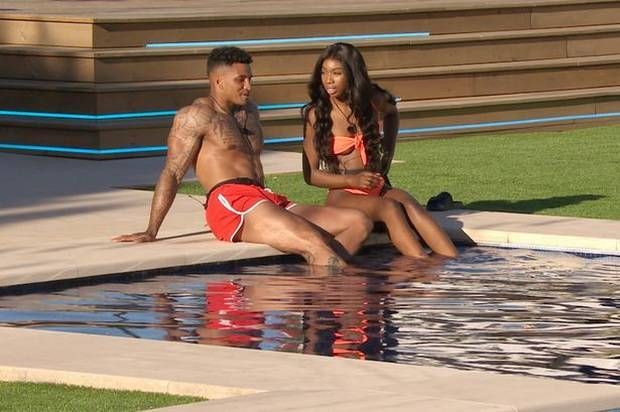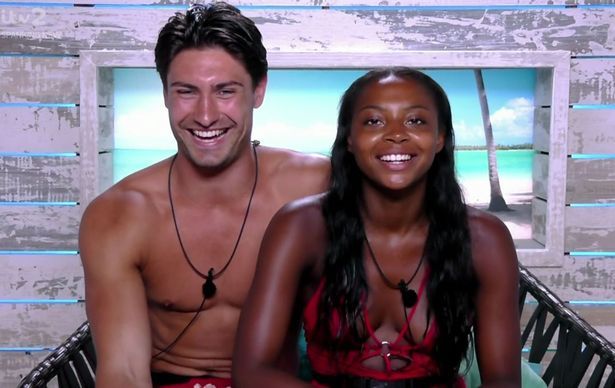
The racism in Love Island’s first coupling ceremony has reared its ugly head again
Why does this keep happening?
Every year, Love Island's black contestants are the last to get picked during the first coupling ceremony. Last night's episode was no different with the show's only black contestants Sherif, Yewande and Michael being picked last. And as always, it was an uncomfortable watch because it reminded us of an uncomfortable truth. Whether they do it consciously or not, Islanders have shown their underlying racism problem when it comes to their romantic "preferences" yet again this series.
Marcel Somerville, who was picked last in the third season of Love Island in 2017, tweeted about this yesterday. He wrote: "This is mad!!!!! #LoveIsland flash backs! Black guy, black girl and mixed race guy all left unpicked. Mad!!!!"
For the past four years, the contestants picked last have all been black. It happened to Malin in 2017, Marcel in 2017, Samira in 2018 and Yewande in 2019. But why is is this still an on-going issue? Especially when this is the year Love Island promised to increase the diversity of the cast when it comes to ethnicity, sexual preferences and body size?
Unfortunately, it comes down to what our society portrays as attractive in popular culture. To put it plainly, western-beauty standards dictate that whiteness as an ideal, while blackness is undesirable.
So it's no surprise that just like Samira, Yewande was picked last in the first coupling ceremony. After all misogynoir (misogyny directed towards black women where race and gender both play roles in bias) is embedded in our society, especially when it comes to dating.
Dating app trends show that ethnic minorities are often discarded as romantic options. According to data from OKCupid, Asian and black men receive fewer messages than white men, while black women receive the fewest messages of all users. Christian Rudder, founder of OKCupid, summarised the findings by saying, "Essentially every race – including other black people – [gives black women] the cold shoulder."
This is not a coincidence. It's institutionalised racism. Racism so subtle, people don't even realise how it's affecting their dating preferences. It's what makes so many people of colour become a second choice to their white counterparts.

Samira Mighty from last year's season was initially rejected by everyone in the villa. No one wanted to be with her. Everyone feared she was about to walk out. She was painted as unlucky in love, when in fact she was a victim of anti-blackness. The problem wasn't a lack of diversity, but the attitude within our society when it comes to dating people of colour – specifically dark-skinned black men and women.
Writer Habiba Katsha doesn't want to see black women on Love Island anymore. In a gal-dem article, she writes: "I was happy to see a black woman on screen, but deep down I knew it wouldn’t end well. A few minutes into the first episode someone asked her if she could twerk and I realised that this kind of racism was what I’d be watching for the next couple of weeks."

But no one wants to admit the Islanders' preferences are low-key racist. Fiat 500 Twitter will write: "If racism exists on Love Island, how come Josh and Wes were so popular with the girls last year?" That's because there are even more complex issues that come into play – fetishisation of mixed-raced contestants and colourism.
Fedora Abu writes for iNews: "There’s more to it when it comes to a particular taste for mixed-race men. It’s a desire to taste blackness, but in its most palatable form. It’s a fascination with what’s 'exotic' but not too unfamiliar. It’s a preference for lighter skin over dark. A certain caramel hue. Society’s gradual acceptance of mixed-race people as beautiful might appear to be a welcoming of more diverse types of beauty, but it’s only so long as they don’t stray too far from the Eurocentric norm."

Colourism is the discrimination against individuals with a dark skin tone. People of the same ethnicity can have different skin tones, which will inevitably have an effect on how they're treated. For example, colourism is the reason new mix-raced Islander Amber says she doesn't like black guys. Colourism is probably also the reason none of the girls picked Sherif in last night's coupling, but blamed it on his yellow shirt instead.
The same arguments come out year after year and people find all sorts of ways to justify subtle racism on the show. And this is the thing, a diverse cast alone won't solve the painful problems witnessed in the previous seasons. It seems the issue isn't about how many people of colour you can squeeze into the villa, but the attitudes other people have towards them.
Related stories recommended by this writer:
• Love Island claim cast won’t be attracted to plus-size contestants
• Enough is enough: Samira isn’t unwanted, she’s a victim of anti-blackness
• It’s not ‘bad luck’ but colourism that’s stopping Samira from getting picked





















